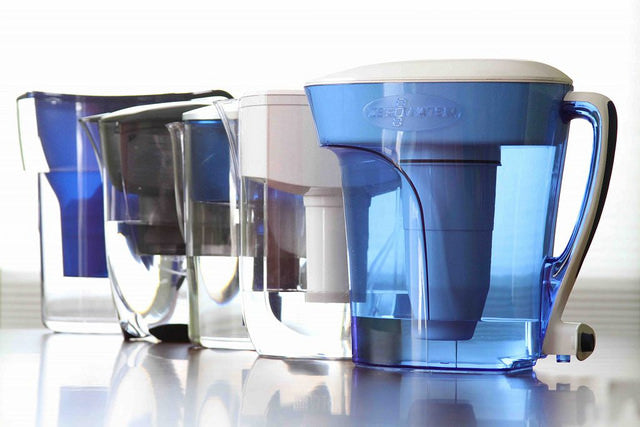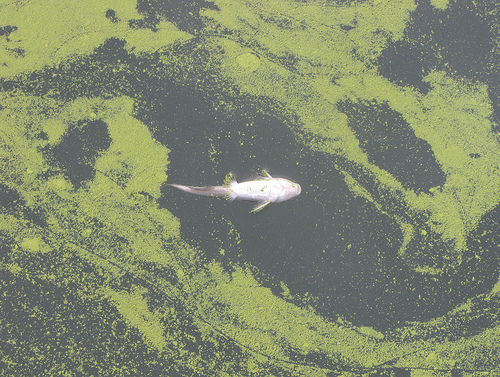
Buyer Beware: Not all Water Filters are Created Equal for Microcystin Removal
By Dan DeBaunShare
Water filters that are designed to remove harmful contaminants from drinking water are not necessarily all created equal, a new study has revealed.
Researchers from The Ohio State University assessed the ability of three popular water filter pitchers to remove microcystins from drinking water. Microcystins are toxins which accumulate in water during harmful algal blooms and pose both an environmental and public health risk. The ability to remove these toxins varied depending on the type of water filter, and while one excelled, two allowed the harmful toxins to pass through the filter to effectively pose a health risk to whoever consumed the drinking water.
Update 7/15/2019 - The Berkey filters do remove Microcystin and Cyanotoxins from the water. For information on how the Berkey water filter performs removing this algae, please see Berkey Algae Bloom and Microcystin Removal Testing Results found here.
The study, which was recently published in Water Science Technology: Water Supply, found that the first water purifier, which consisted primarily of coconut-based active carbon, filtered the water the fastest but only removed a maximum of 50% of the microcycstin toxins from the water as it passed through the filter. However, the purifier with the slowest action, whose filter was constructed out of a blend of activated carbon, removed the microcystins to undetectable levels.
"Because drinking-water treatment plants also use activated carbon, I figured that these home filters might also remove some microcystins, but I wasn't expecting results this good and such big differences among the pitchers," said Justin Chaffin, the study's lead author and a senior researcher and research coordinator at Ohio State's Stone Laboratory, a research hub located at Lake Erie serving scientists researching issues that affect the Great Lakes.
The Danger of Microcystins
Harmful cynobacterial blooms pose a health risk to consumers who drink water contaminated with the toxins. Microcystins are one of the most commonly found toxins that occur following harmful algal blooms, and pose a substantial risk to wildlife, pets and humans. Exposure to these toxins can result in anything from a mild rash on the skin to more serious health issues or even death due to kidney or liver damage.
In 2014, microcystin contamination of the drinking water supply to Toledo, Ohio, left over 400,000 residents without water for days on end.
"Since then, many residents drink bottled water and others rely on these filtration pitchers as backup, in case the water treatment plants miss a return of the microcystins," even though there have been no similar threats since then, said Chaffin. "At public events, residents kept asking me 'Does my water pitcher remove microcystins?' and my answer was always, 'I don't know'".
So, in order to get answers to these questions, Chaffin set about designing a study that would test the effectiveness of water pitchers at removing these toxins. Although no brand names are mentioned in the study, the researchers divulge that they are commonly available in retail stores and range in price from around $15 to $50. Anyone interested in learning more can analyze the study results a little closer to compare features of the filters to help make an informed decision when purchasing a water filter, Chaffin suggested, alluding to the fact that you get what you pay for.
 Common water pitcher filters. Image courtesy of www.yourbestdigs.com
Common water pitcher filters. Image courtesy of www.yourbestdigs.com " width="640" height="427" />
Common water pitcher filters. Image courtesy of www.yourbestdigs.com
"In general, the cheaper the pitcher, the worse job it did filtering out the toxins," Chaffin said.
Pitcher Testing Results - Removal of Microcystin
Using contaminated water collected from Lake Erie, the researchers diluted microcystins to various concentration levels before running the samples through the three common water purifying pitchers. They found that the purifier with filter media consisting of a blend of different activated carbon types, and which filtered the water the slowest, consistently proved more effective at removing the toxins from the water.
The water purifiers work on the principle that contaminants bind to the activated carbon as the water passes through the filter. The researchers found that when microcystin concentrations were 3.3 micrograms per liter — equivalent to the microcystin levels reported during the do-not-drink advisory at Toledo in 2014 — microcystin levels were reduced by all water pitchers, but were only undetectable in the purifier that took the longest to filter the water.
"Contact time really seems to matter. If you run the water through really fast, the microcystins and other organic molecules don't have time to bind to the carbon molecule and stick to the filter," Chaffin explained.
Filter time varied between pitchers, with the most effective at removing the toxins taking over six minutes to filter a liter of water, the second best taking nearly four minutes to filter a liter of water, while the least effective purifier took just under two minutes to filter a liter. The purifier that was least effective had a filter constructed entirely out of cocunut-based active carbon, while the more effective purifiers filters consisted of a blend of different types of activated carbon.
To test whether the toxins remained bound to the filters the researchers ran purified deionized water through each of the water filters, then tested the water for the presence of microcystins. They found none, suggesting that once removed, the toxins remain bound to the filter.
However, Chaffin recommends that water filter pitchers be used as a safety net by consumers who are concerned that microcystins may pass through water treatment facilities undetected rather than to purify water when a do-not-drink advisory has been issued and bottled water is recommended.
"But when there isn't a warning, these filters are much cheaper and better for the environment in the long run than bottled water," said Chaffin. "You aren't creating mountains of empty bottles."
Water Pitchers Vs Berkey - Microcystin Removal
The study found that water pitcher filters with filter media consisting of a blend of different activated carbon types, and which filtered the water the slowest, consistently proved more effective at removing the toxins from the water. This data further supports Berkeys official statement on microystin removal.
The Black Berkey contact time is considered one of the longest, if not the longest in the filtration industry. Also, the Black Berkey filters use a combination of approx 6 different types of filter ingredients, which allow the filters to last for approx 6000 gallons per set of 2. In comparison, many of these water pitcher filters in this test need to be replaced every 100 gallons. Finally, the black berkeys match or outperform the chemical and contaminant removal rates of water pitcher filters across the board.
Journal Reference
Justin D. Chaffin, Erica L. Fox, Callie A. Nauman and Kristen N. Slodysko. The ability of household pitcher-style water purifiers to remove microcystins depends on filtration rate and activated carbon source. Water Science & Technology: Water Supply, (2018) In Press.
-
Regular price $234.00 USDRegular priceUnit price / per
-
Regular price $327.00 USDRegular priceUnit price / per
-
Regular price From $367.00 USDRegular priceUnit price / per
-
Regular price From $408.00 USDRegular priceUnit price / per
-
Regular price From $451.00 USDRegular priceUnit price / per
-
Regular price From $478.00 USDRegular priceUnit price / per
-
Regular price $332.50 USDRegular priceUnit price / per
$350.00 USDSale price $332.50 USDSale

Dan DeBaun
Dan DeBaun is the owner and operator of Big Berkey Water Filters. Prior to Berkey, Dan was an asset manager for a major telecommunications company. He graduated from Rutgers with an undergraduate degree in industrial engineering, followed by an MBA in finance from Rutgers as well. Dan enjoys biohacking, exercising, meditation, beach life, and spending time with family and friends.
~ The Owner of Big Berkey Water Filters
















